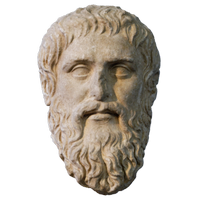The Shadow Effect

The Allegory of Plato’s Cave and its Effects
Introduction
The philosophy of the project presented in this website is based in the allegory of Plato’s cave. In their philosophical discussions, the ancient Greek philosopher Socrates and his student Plato talked about the creation of an ideal state. The portion of their discussion devoted to the “Allegory of the Cave” is an interesting one. In the following, we discuss the Allegory and present our own interpretation..
The Allegory
Imagine that there are people living in a cave all their life, and that they are chained on a wall in such a way that they can see only straight ahead. Furthermore, imagine that behind them there is a fire burning, and that between them and the fire there is a stage for a puppet show with the shadows of the puppets projected on the wall in front of them. Now, if the puppeteers are talking, their voices could be perceived by the chained cavemen as coming from the shadows in front of them, and that these shadows represent reality, where in fact “reality” is on the other side of the fire and the wall. We will name this condition “The Shadow Effect”.
Then, if some of these people break the chains, and walk out of the cave. Naturally, they will be blinded by the bright light of the sun and they may decide to return to the cave. If they return back, they will live in darkness as before, but if they stay out of the cave and adjust their vision to the new environment, the sun’s light will help them to see the real world.
Now, assume that that some of those that they remained outside decide to return back to the cave intending to talk to their fellow cavemen about their out of cave experiences (reality), most likely they will be viewed by some of the in cave men, with skepticism and negative attitude. Those with negative attitude will continue to live in darkness, while those who will adopt the new ideas will have a better chance to improve their lives (Reference 1). Clearly, this is due to the influence of the Shadow Effect.
The Relation of the Shadow Effect to the Way we Make Decisions
In our life, the influence of the Shadow Effect, begins from the first day of our life with influences from our immediate environment (i.e. parents, grandparents, , cultures, religions, educational systems, ethnic history, working environments, friends, and even geographical environment). These influences, apart from heredity, are the main source of information which almost permanently affects the way we think, behave, and make decisions. That is, they play an important role in the creation of our character and personality. The following popular saying, “tell me who is your teacher, to tell you how much you know”, describes this situation clearly. Fortunately, with the exception of heredity, all or most of these influences could be altered for the best and can help us become more prudent individuals who can make better decisions, and create a better world.
Remarks
If our life’s objective is collective happiness, then it should be clear to everyone of us that the way we are conducting our lives today is not doing that, and this seems to have something to do with the Shadow Effect. Therefore, it is important to examine the Shadow Effect influential factors, identify the negative ones (for example, greediness, selfishness, abusive/inhuman/cruel/unfair/unjust/corrupt/unethical/hypocritical/egotistic/insensitive and fanatic behaviors) and eliminate them, but retain those which encourage honesty, truth, ethics, love, care, sacrifice, sensitivity, kindness, and peace.
The important point is to open our minds (get out of the Shadow Effect), know the real facts and truths about the issues that we are facing everyday, identify our true enemies (i.e. diseases, environmental pollution, poverty, and injustice) and make prudent changes.
It seems that the best way to make these changes and have a long lasting effect, is to slowly and carefully introduce these changes to the existing educational systems (from the lowest to the highest level), so each individual will be educated with material that emphasize kindness and respect towards each other, to the animals and to the environment. We believe that although this is a very difficult objective, over time, it can be done. It is imperative to start doing it without delay, otherwise the problems which we are facing today will be much more serious in the near future. A good example of the importance of education/training can be found in Reference 2. There, one can clearly recognize that even lions can be trained to be kind. If this is possible with lions, it should be possible with people as well.
The non-profit Corporation “For a Kinder World” (FKW), is making an effort to minimize the Shadow Effect.
References:
1. “The Republic”, Plato, page 240: The Simile of the Cave, Penguin CLASSICS (2007).
2. ” Borne Free, Lioness of two worlds” , Joyn Adams, Pantheon Books, New York, 2000



